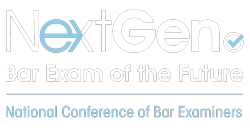
It’s hard to believe it’s already been a year since NCBE’s Board of Trustees approved the Testing Task Force’s recommendations for the next generation of the bar exam. As we look ahead to the work still to come in 2022, we are also reflecting on everything we’ve accomplished over the past year.
Following the Board’s approval of the Task Force’s recommendations, NCBE moved quickly to establish an Implementation Steering Committee to guide and oversee the substantial work required to make the new exam a reality. A high-level timeline providing an overview of the implementation process for the next five years is available on the next generation bar exam website: https://nextgenbarexam.ncbex.org/about/implementation-timeline/.
In June, NCBE announced the formation of the Content Scope Committee, composed of 21 members from a variety of backgrounds, including bar examiners, legal educators, deans, and practitioners. The committee, which was tasked with determining the breadth and depth of the content on the next gen exam, worked together through the summer and fall to develop detailed recommendations about the topics for the eight Foundational Concepts & Principles and the seven Foundational Skills that the Testing Task Force recommended be measured on the new exam. A working draft of the exam content specifications will be published in spring 2022 and refined as test question development progresses and pilot testing is conducted. Final content specifications will be published well in advance of the first administration of the new exam, tentatively planned for 2026.
In addition to the work of the Content Scope Committee, NCBE’s test development staff began working in September with teams of question drafters to develop and evaluate prototypes of new item types and item sets; pilot testing to determine how the new items perform will begin in 2022. NCBE’s psychometric staff are also evaluating scoring and grading methods for the new exam to ensure overall reliability and validity.
The new exam will be delivered on computers, and NCBE has done substantial work gathering information about administering the exam at testing centers. The alternative is delivering the exam on examinees’ laptops at jurisdiction-managed sites. NCBE will continue to seek input from the jurisdictions as we evaluate options for administering the new exam.
Following a call for applications from administrators and bar examiners in November, NCBE formed the Jurisdiction Advisory Committee, which will provide invaluable input to the Implementation Steering Committee on the many policy issues involved in the transition to the new exam. The Jurisdiction Advisory Committee will also help NCBE gather feedback and information to ensure that the views of all jurisdictions are considered.
What comes next? 2022 will be another busy year as we move forward with the implementation schedule. Watch this space for draft exam content specifications, set to be published this spring, and other updates on the work of implementation.




